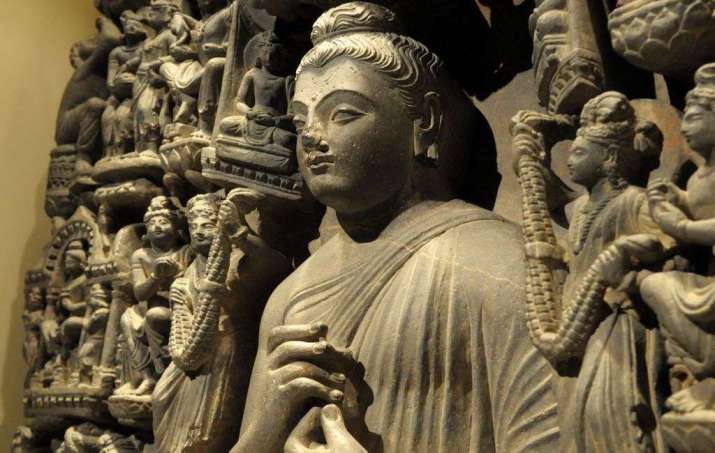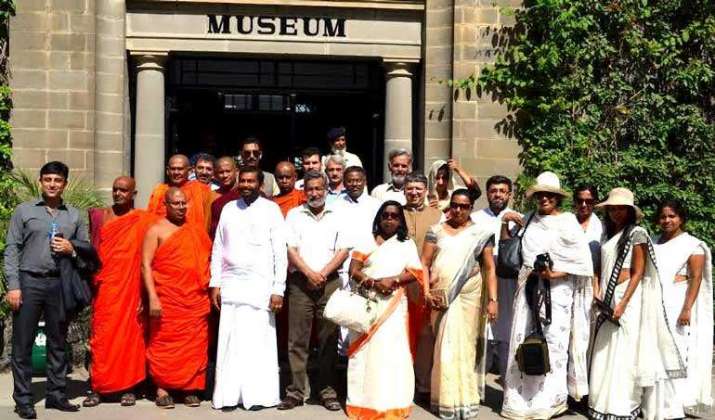FEATURES|THEMES|Commentary
Pakistan, Sri Lanka, and Nepal: A New Bloc of Buddhist Communication?
 Gandharan frieze of the Buddha. From pinterest.com
Gandharan frieze of the Buddha. From pinterest.comSouth Asian regional relations are commonly seen through the lens of Indo-Pakistani or Indo-Nepali relations. It is not surprising, given the vast shadow that India casts over the entire region. This disproportionate influence affects coverage of Buddhist renewal on the Indian subcontinent, with much attention paid to India’s movements concerning Dalit politics and relations with East Asian countries. However, in recent years, a Buddhist détente involving India’s Islamic neighbor has become prominent in English-language news.
On 30 April, Vesak Day, Nepalese ambassador to Pakistan Sewa Lamsal Adhikari organized a peace walk in Islamabad’s lush, green Fatima Jinnah Park with Sheikh Ansar Aziz, the mayor of Islamabad. Diplomats and other members of civil society attended the peace walk. Ambassador Adhikari observed that the quest for peace is one of Nepal’s fundamental foreign policy objectives. Meanwhile, Aziz noted that the Pakistani-Sri Lankan diplomatic community had an important role to play in Islamabad’s development. He cited its work in sectors such as the environment, education, and health, and said that he hoped the Metropolitan Corporation of Islamabad and the Diplomatic Corps would continue to work in these fields and more. (Pakistan Observer)
It might seem surprising to see Vesak celebrated in the capital of South Asia’s Islamic heartland. Pakistan celebrated its first Vesak at an official level in May 2016, when the National History and Literary Heritage Division under Pakistan’s Ministry of Information, Broadcasting and National Heritage hosted a 43-member delegation from Sri Lanka, comprising ministers, senior monks, religious scholars, and journalists. They celebrated the festival in Islamabad and visited the Buddhist ruins of Taxila. During an official visit in January 2016, former Pakistani prime minister Nawaz Sharif visited the holiest Buddhist shrine in Sri Lanka, the Temple of the Sacred Tooth Relic in Kandy.
In 2017, Pakistan participated for the first time in the UN Vesak celebrations in Colombo. Pakistan sent two sacred bone relics of the Buddha to Sri Lanka in a golden reliquary, all of which were from a collection at Pakistan’s Taxila Museum. These objects were displayed in a series of public exhibitions at temples across Sri Lanka.
In recent years, the government of Pakistan has launched modest but consistent attempts to recast its ancient Buddhist, pre-Islamic past as an important component of national rejuvenation. The country has already made a friendly move of reaching out to nations with large Buddhist populations, including China, Singapore, South Korea, Sri Lanka, and Thailand. But the celebration of Vesak in Pakistan is unique to diplomatic ties between Sri Lanka and Pakistan. Both countries have been quietly building Buddhist ties since the 2000s, and with Nepal involved as well, this new, informal bloc of countries looks set to become more prominent in South Asian Buddhist diplomacy.
Buddhism was once a dominant religion in the region known today as Pakistan. The province of Khyber Pakhtunkhwa, along with the Swat Valley, Taxila, Buner, and Bajaur, once comprised the ancient kingdom of Gandhara. Here, Buddhist culture flourished from the second century BCE until the 10th century CE. Gandhara was particularly famed for pioneering one of the earliest schools of Buddhist art.
Pakistani Buddhists live mainly in Sindh and areas such as the Rohi region of South Punjab. Unfortunately, there is little in the way of accurate data that reveals the exact number of Buddhists in Pakistan. Some of these Buddhists have reported experiencing discrimination, physical violence, and the destruction of their property. They are relegated to the margins of society as the faith of a tiny minority.
 Sri Lankan delegation at Taxila Museum. From ft.lk
Sri Lankan delegation at Taxila Museum. From ft.lkLala Rajoo Raam, a local representative of the Baori Buddhist, has expressed worries about his community. He is the only person with a matriculation-level education in his village. “Most of the people in our community do not have CNICs [computerised national identity cards]—how could you expect any citizens’ rights? Our population is exceeding 16,000 persons but in papers it is far less than that figure.” (The Friday Times)
Lala Rajoo Raam also said that a fundamentalist Hindu attack on a mosque in Babri, India, led to a revenge attack by extremist Muslims on his local Buddhist temple. “As you know, here in Bahawalpur City, many Hindu temples became targets for revenge—in that process, our temple was also demolished. After this we never built our temple again. We have good and friendly relations with the Muslims of neighbouring villages. I think making ourselves a temple could cause conflict and might encourage hatred against us. We have a moorat as a symbol of Buddha in every home. We also celebrate Holi and Dewali each year. We gather each year at Baba Ghoosai—the place where every year we mark our religious festivals.” (The Friday Times)
While there are concerns on the ground among the Buddhist community (and these incidents need to be monitored), diplomatic ties between Pakistan and Buddhist-majority countries have continued to improve. Several translations of scholarly studies have been commissioned by the Pakistan High Commission: a 2006 Sinhala translation of Pakistani academic Ahmed Hassan Dani’s Gandhara Art in Pakistan (1992), a 2007 Sinhala translation of Ihsan H. Nadiem’s Buddhist Gandhara—History, Art and Architecture (2003), and a project to rediscover Pakistan’s ancient links to Buddhism in 2009. The high commission’s former press attaché, Muhammad Daud Ehtisham, was also reported to be keen on promoting Buddhist cultural ties between Pakistan and Sri Lanka between 2010 and 2016.
Today, there is effectively no strong tradition of living Buddhism in Pakistan. However, there is hope that Buddhism can help provide a window to its past and identity, as well as a channel to consolidate its relationships with Buddhist-majority nations. One area of concern is the situation of Buddhist minorities in the country. The government needs to ensure that they are free from any predations and violence committed by fundamentalists of any stripe. If the government’s newfound commitment to Vesak can trickle down to benefit these minority communities, its Buddhist outreach will enjoy a burgeoning, consolidated legitimacy.
See more
Nepal embassy organizes peace walk (Pakistan Observer)
Pakistan’s first-ever Vesak Festival concludes successfully (Daily FT)
Vesak festival observed in Taxila (Dawn)
Pakistan's Vanishing History (The Diplomat)
Meeting Pakistan’s Buddhists (The Friday Times)
Pakistan to participate in UN Vesak celebrations in Colombo (The High Commission of Pakistan Colombo)
Related features from Buddhistdoor Global
Diplomacy, Heritage, and Cultural Pride: Reviving the Buddhist Legacy of Islamic Pakistan
Takht-i-Bahi: The Jewel of Pakistan’s Cultural Heritage
Treasures from Asia’s Oldest Museum: Buddhist Art from the Indian Museum, Kolkata – Exhibition Review
Related news from Buddhistdoor Global
Pakistan Sends Sacred Buddhist Relics to Sri Lanka for Vesak Festival
Falling into Ruin: The Tokar-Dara Buddhist Stupa in Pakistan
Chinese Delegation Visits Buddhist Sites in Pakistan’s Khyber-Pakhtunkhwa
Pakistan Unveils 1,700-year-old Reclining Buddha Statue at Bhamala Archaeological Site
Buddhist Monks Praise “Hospitality, Love, and Respect” from People of Pakistan During Vesak Observation














